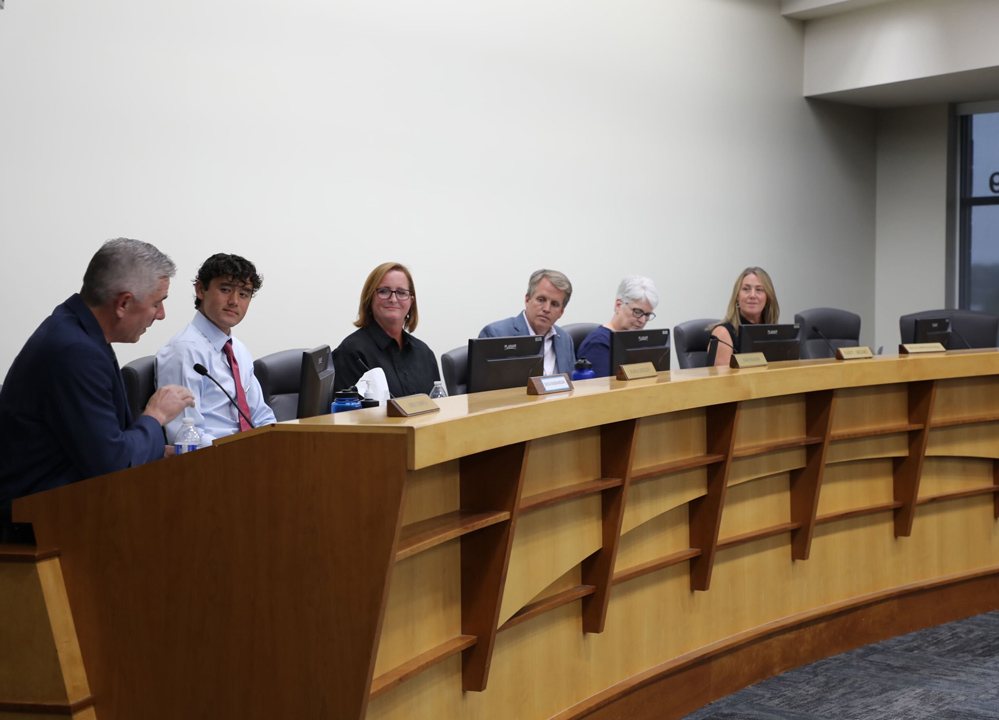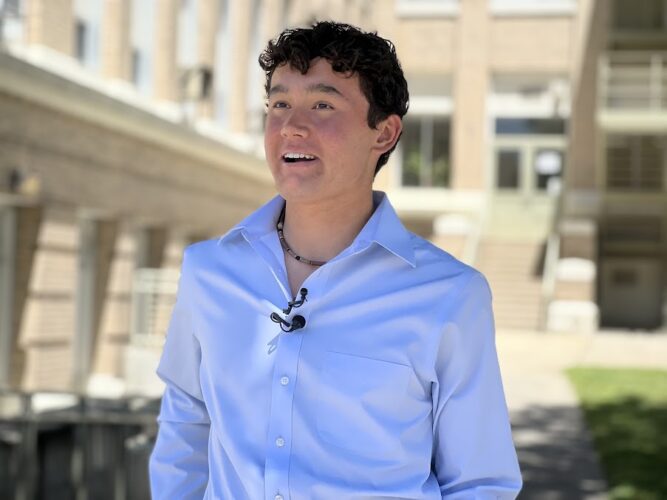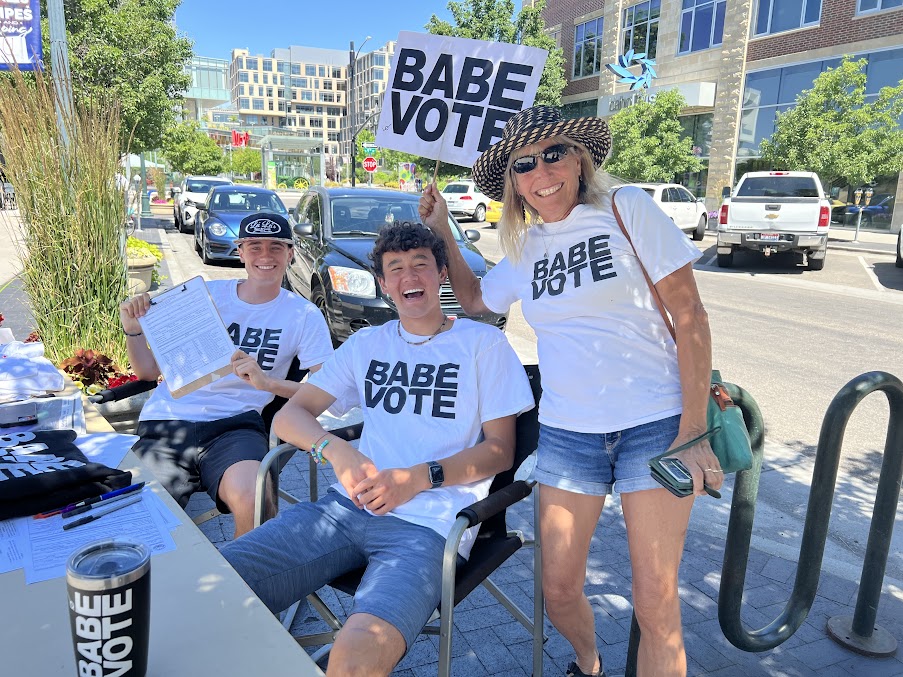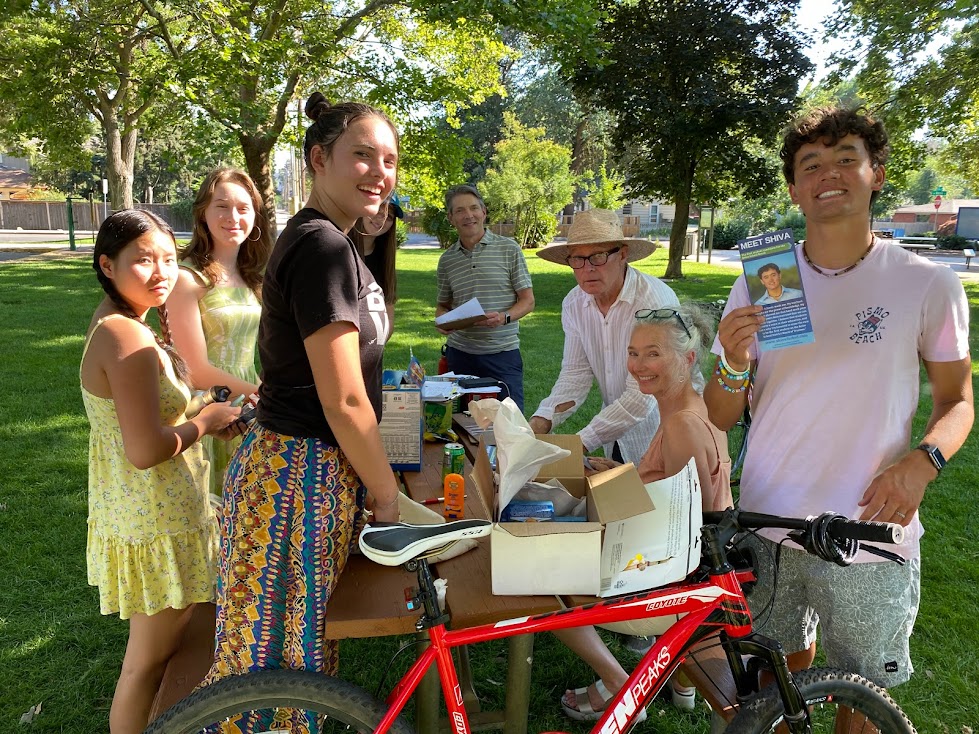This story was produced by The 74, a non-profit, independent news organization focused on education in America.
When Shiva Rajbhandari won a seat on the Boise school board in September 2022, the 18-year-old made national headlines for besting a far-right incumbent in a state known for book bans and critical race theory crackdowns.
But after spending most of a school year in a role at the center of America’s education culture wars, the high school senior said he’s used his first-hand experiences to be a voice of “moderation” on the seven-member board.
In the face of extremist views, he counters with a dose of reality: “Regardless of what Tucker Carlson says is going on in Idaho schools, here’s what’s actually going on,” he’ll offer. “Only students can provide that on-the-ground perspective.”
In Boise, Rajbhandari’s election win has put in motion a chain reaction of efforts to elevate student voices. The school board now includes a brand new youth advisory council and the district this year administered a first-ever mental health survey to take account of the struggles its students are experiencing.
Meanwhile, the teen has also helped usher along a Climate Action Plan the board is implementing — a measure he had long pushed for as a climate activist with the Sunrise Movement in his days before holding elected office.
The 74 caught up with the young politician, who’s juggling the responsibilities of senior year alongside oversight of his roughly 23,200-student district, for a Zoom conversation that ranged from his efforts with the nonprofit BABE VOTE to facing off against counterprotesters wielding AR-15s.
This conversation has been lightly edited for clarity and length.
The 74: It’s been the better part of the school year that you’ve been on the Boise school board. What has stood out to you most so far?
Shiva Rajbhandari: Coming into the school board, I thought this was really the end-all be-all of problem solving. But there’s such a big team that works across our district to write good policy and to propose a strong budget and to make sure that we’re hiring the top staff to keep our schools running. Learning about the incredible people across our district has been really rewarding.
Also learning how slow change is sometimes. Coming into this role was this transition from being an activist and really calling the shots. Like, we would meet on a Thursday and have a protest organized by Saturday. Those things were very quick.
Now, there’s a lot more accountability — to our patrons [constituents], to our students — so things happen slower. But it’s neat to consider all aspects of the solution and think critically about how we can best prepare students for college, career and citizenship while maintaining the integrity of our district and the faith of our patrons.
That must be an interesting transition, from activist to school board member. So what are some of the issues you’re working on now where the pace of change has felt slower?
One thing I’m really excited about is establishing a permanent student position on the school board. We’ve been talking about it since January and before that, I was talking with trustees, talking with staff, about how we could shape this policy. [It’s gone to several committees including our student advisory committee and] now we’re waiting until September to take it back to the Governance Committee for review and then hopefully passing. So that’s one example.
Another example would be our district sustainability commitments. This [issue] is why I ran for the school board initially. I led this campaign with my fellow students across our district to establish a clean energy commitment and a long-term sustainability plan for our schools. We’d seen districts across the country move quickly and then our district was slow and deliberate about it. But ultimately, our efforts did lead to the passage of this commitment on clean energy by our school board.
Some things just take a lot of time, like reviewing all the carbon emissions of our district. And then [the question of] what does the long-term plan look like that saves our taxpayers money. That’s going to take probably another year or two to craft that plan and get that through.

Going back to the effort to get a permanent youth board member, in your view why is youth voice so important in school decisions?
Students are the primary stakeholders in our education. And yet, our school boards are elected by people who are over 18, the majority of whom are no longer in K-12. They tend to be parents or grandparents or community members, but really only students can provide that on-the-ground perspective of what’s going on in our schools. I think having students on school boards is about bringing in a perspective that is vital to policymaking.
In addition, elevating students to positions of leadership empowers an entire generation of students within your district. Because when students understand that their voices are being taken seriously, that more than anything allows students to achieve their education goals.
How have your friends and peers reacted to your role on the board? Are they telling you things to bring up in meetings?
Absolutely. Our whole district is getting so much more engagement with students and it’s helped us think outside the box about how to engage students in policymaking.
For example, we did a districtwide mental health survey. That’s something we’ve never done before and we found out 30% of our students have had depression or suicidal ideation. We identified stress and social isolation as key contributing factors we really want to tackle. But that’s something our district has never done before, not because our district didn’t value student voices, but I don’t think we understood how incorporating student input could help our district.
We also put together a student advisory committee [to the school board] and we have peer feedback groups. We’ve seen so many more students attending our board meetings, asking questions of our board, bringing ideas forward.
It’s a simple thing to have [a student] up there on the dais, but it really opens the floodgates for transformative change within a system that is often really rigid.
I saw that you made YouTube previews of the last few meetings. Was that an effort to make the board more accessible to your peers?
Yeah. I think there’s really this misunderstanding of what the board does, and how folks can give input. And so the goal of the video is to communicate to students, ‘Hey, this is what’s going on at our board meeting.’ Everybody should be able to participate.

Going back to when you won your seat, that was a victory over an incumbent who had an endorsement from a far-right group. How have you navigated extremism in the campaign and in your term on the board?
Our state is split ideologically between the far right and the really far right. And there’s this hate group called the Idaho Freedom Foundation, a policy think tank, whose stated goal is to abolish public education in our state. And so we’ve seen that come up time and time again with allegations of indoctrination or grooming in our schools. Now we’re seeing the third iteration of that, which is vouchers in the name of school choice, giving public dollars to private and potentially religious institutions with limited accountability.
I think the perspective that I’ve brought is one of moderation. Regardless of what Tucker Carlson says is going on in Idaho schools, here’s what’s actually going on. And here’s what students actually need. No one is scared about a [female-identifying person with male genitalia] going to the girl’s bathroom. What folks are scared about is their friends committing suicide, because we don’t have the mental health resources or the resiliency factors that we need.
It’s bringing an ounce of reality back to these ideological conversations. I’m super lucky that, in our district, the problems we have with extremists aren’t nearly as bad as in the rest of the state.
Your time on the board isn’t the first time you’ve interfaced with right-wing activists. Can you tell me the backstory there?
Yeah, gosh. It’s funny, I think nationally, when people hear about Idaho, it’s like, ‘Oh, my gosh, people are running around with guns.’ And living in Idaho, it’s almost like a fact of life, you organize a protest and folks show up with AR-15s.
The first time I interacted with the group I think you’re referring to, the Idaho Liberty Dogs, I was in ninth grade. We were organizing a protest on Capitol Boulevard and it was 70 kids who got together with signs and we blocked the street, we were playing music and it was honestly a fun day. These folks showed up with AR-15s to our rally. Not only that, but then a ton of cops showed up and they all were friends with the [counterprotesters] who weren’t even from Boise.
Then last year, a student brought a gun to Boise High, the school I’m at now, and he was suspended and not allowed to walk at graduation. This same group tried to organize this armed protest outside our school.
The threat of extremism and militarism is very real in Boise. But we’re not afraid of them. We’ve been through so much. I think that takes away the power when people aren’t afraid of you.
I know we’re jumping from one hot-button issue to the next, but I also wanted to ask about book bans. I saw there’s some state legislation proposed allowing parents to sue schools for ‘harmful’ books. And there have been several Idaho districts, not Boise, that have enacted bans. So I’m curious how that’s come up in your time on the board?
What’s a little humorous to me about the whole book ban thing is, it’s not parents and it’s not students asking for books to be banned. It’s generally random people who have heard something. And so, for example, in the nearby city of Meridian, there was this group that tried to get 200 books banned from the school library and I think they just pulled the list off the internet because half of the books weren’t even in the Meridian library.
To me, I will never support any kind of book bans ever because I think free access to information is the cornerstone of democracy.
The narrative that’s being missed is that book bans, frankly, are disempowering to students. It’s alleging that students don’t have the agency to know what they should read. Schools are a resource, they’re a tool for students to learn and engage and ensuring that there’s open access to information is critical to that.
You wrote a recent op-ed about efforts to reduce youth voting, which seems like a big issue for you also because I saw you co-lead the organization BABE VOTE. Can you tell me about that?
BABE VOTE is a nonprofit, nonpartisan, voter advocacy organization promoting voter registration among young people. We just got the data back and Idaho is the number one state in the country for growth in registration of voters [18 and 19 years old] between 2018 and 2022. So the efforts that we’re doing are working and it’s really exciting.
The [Idaho] House and Senate both just passed a bill banning the use of student IDs at the polls, which for many students, that’s their only form of ID, especially college students.
As soon as the governor signs this bill, we’re actually going to be suing the state and protecting the right to vote. So it’s that kind of stuff, knocking on doors, registering people and reminding people, ‘Hey, there’s an election,’ and then protecting the right to vote in the legislature and across the state.

What’s it been like to juggle all this work alongside senior year?
It’s been a little bit crazy. Honestly, being on a school board is [manageable]. Any student can do it. People try to make it something that it’s not.
Senior year, you have so many opportunities and it’s such a wide world. Sometimes it’s hard to get up for first period everyday. But just keeping a Google Calendar and checking in with my friends and making sure that I’m taking time for myself. Also remembering that I don’t have to do everything right; I have this whole team of folks who have supported me in my election on board and support this climate activism work.
One of the things that’s kind of taking a beating has been my track practice. Sometimes it’s hard to get to my practices.
What events do you compete in?
I run the mile and the 800 [meters].
And do you know what your plans are for next year, both in terms of school and whether you’ll maintain the position on the board?
Yeah, I’ll stay on the board. I made a commitment. All meetings we can mostly do virtually, but I will be leaving the state for college. And I want to study public policy and maybe go become a lawyer or something. [Rajbhandari has been accepted to UNC-Chapel Hill, Whitman College and Stanford University and is still deciding where to attend. He was elected to a two-year term.]

And last, who’s one teacher who made the biggest impression on you and why?
Well, there are so many. My teachers were the best teachers ever. One teacher, Monica Church, she was my Student Council teacher and capstone teacher sophomore year. She’s just been such a mentor and a guiding force in my life. Whenever I have a problem or something I want to talk about, she’s the first person I call.
I remember one time in my capstone class, I was running for [student body] vice president and I was a sophomore, so no one had ever done that before, and I was talking about ‘Hey, the election’s tomorrow. Everyone, make sure you go vote.’ And one of my friends, who is kind of a contrarian, goes, ‘Why would you ever vote for Shiva?’ Then Ms. Church was like, ‘Well, I would vote for Shiva. And one thing I’ve learned in the last eight months has been never bet against him.’
Now that’s a source of [motivation]. Whenever I’m like, ‘This is hard,’ I remember Monica Church, someone I respect more than anyone, said, ‘Never bet against Shiva.’
The 74
